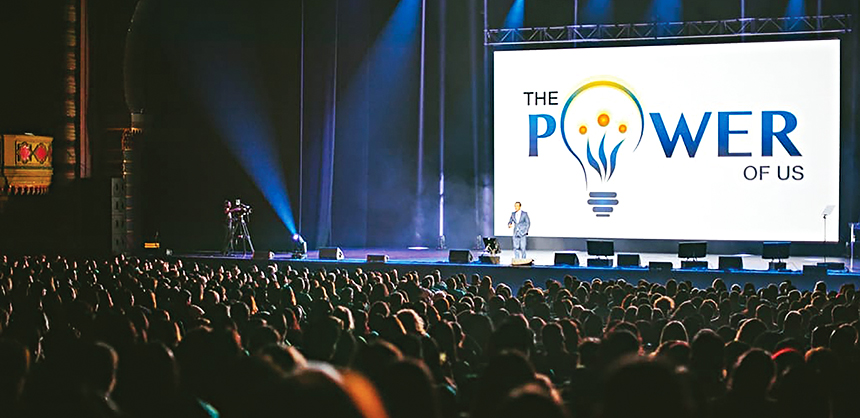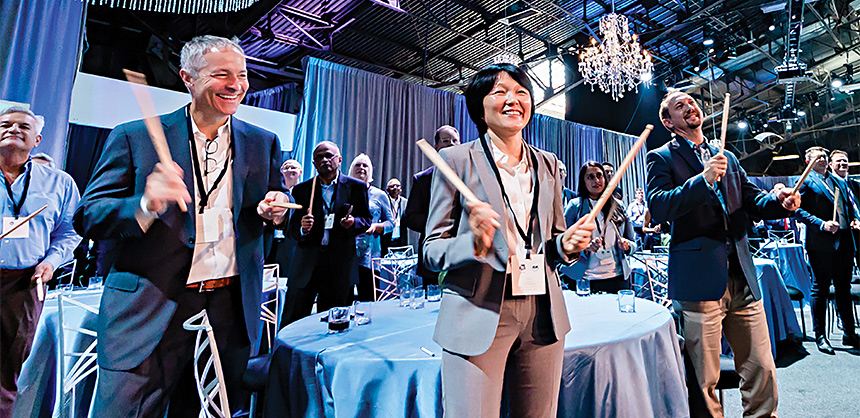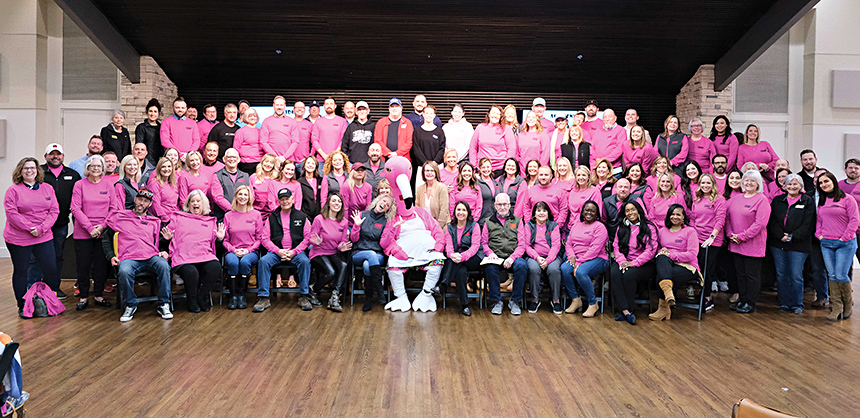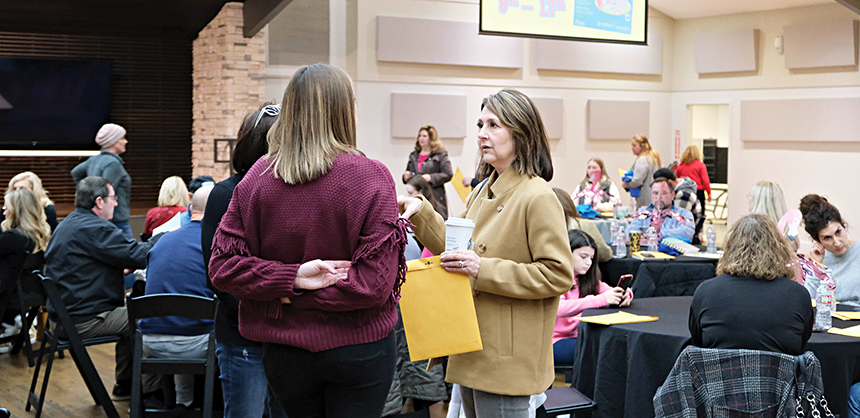Authentic EngagementJuly 6, 2023
Using Quality Content to Capture Attendee Focus By Maura KellerAuthentic Engagement
Using Quality Content to Capture Attendee Focus
A speaker engages the audience at the All-Hands Conference in Los Angeles. Courtesy of Denise Gailbraith/ Event Solutions
Association professionals are busy people. When they carve out time to attend an association-based meeting or event — whether it is for three hours or three days — they expect something in return. They attend for informational, educational, and networking purposes. They also expect to be entertained, so it is vital that meeting planners thoroughly evaluate and select the ideal entertainment options to keep attendees engaged.
According to Sarah Gentry, director of special events at The Home Builders Association of Greater Tulsa, as an association, they are empowering the success of their members as the professional resource for housing in their community.
“By providing quality entertainment or content, we are creating a ‘fun’ or ‘inspiring’ atmosphere, which, in turn, leaves our attendees feeling ‘inspired,’ and if they are having a good time, they are more likely to be more engaged, network more, learn more and overall feel empowered at the end of the event,” Gentry says, adding, “Everything these days is all about the ‘selfie’ post. Creating content and an environment where your attendees want to ‘post’ about the event, to me, is what we are seeing the most of these days.”
Isaac Watson, lead event strategist and founder of Kickass Conferences, has 14 years of experience in the events industry and has produced conferences and events in the United States and Europe. “It’s all about authentic audience interaction,” says Watson. “A good entertainer will be able to play to the crowd and nudge people just enough outside of their comfort zone for them to open up for a shared social experience. Encouraging vulnerability, non-judgmental contributions, and meeting attendees where they are is key to cracking open our defense mechanisms and helping the group maintain an open mind.”
As Watson explains, meeting and event attendees have limited attention spans, and sitting in a room or watching a virtual event can become tedious very quickly, especially if the program is focused on disseminating information in a one-to-many format.
“Engaging entertainment breaks up the monotony and helps those in the room switch modes, activates different parts of the brain and clear space for what’s next,” Watson says.

Attendees engaged with a drum session over lunch at a conference in San Francisco produced by Event Solutions. Courtesy of Denise Gailbraith
Entertainment Trends
Historically speaking, there seemed to be two major trends in entertainment throughout meetings and events over the last few decades: first, strict performances, whether it was music or magic or something else presented from stage that had nothing to do with the program.
“The other,” Watson says, “was more focused around wellness, often delivered through stretching or chair yoga, for example.” He adds, “One of the biggest lessons coming out of Covid is that people need and want social connections with others more than they want spectacle or health practices. Entertainment can create space for that by creating a shared experience and breaking out of the traditional relationship of presenter to consumer.”
Watson recently brought a “dance ambassador” and storyteller in at a few different events last year as entertainment, and also as one program’s emcee. In her segments and sessions, the dance ambassador incorporated world music, body movement, dance and storytelling into the programs in a way that a DJ or professional emcee simply can’t. Attendees were able to participate to their own level of comfort, from purely watching/listening to moving on their own to contributing to the storytelling, and share their experiences in a way that created a unique, shared moment of time.
“Many attendees commented about how unexpected yet enjoyable it was. Some admitted they felt uncomfortable moving in public but this helped them find ways to express themselves in a safe environment,” Watson says. “And it helped all of them integrate the content from the rest of the programs into their lives and better assimilate the learnings.”
Another example that Watson is aware of, but hasn’t yet incorporated into an event he’s planned, is working with improv-focused groups to design a program, host it as emcees and provide interstitial or recap segments with their troupe of performers.
“These groups are able to find humor, tie narrative threads across a program and assist the audience in sharing their experiences and incorporating what they’ve learned in a group setting,” Watson says.
Andrea Caldwell, event planner and founder of Practical Productions, manages conferences, trade shows, meetings and events. A recent event Caldwell led in May in Providence, RI had the highest attendee ratings for best overall event ever. The event was an “All Hands” experience – meant to gather attendees who work remotely to work and have concentrated “Water Cooler” time.
Some of these engaging activities included:
- Can Jam: art tour of the city with Graffiti Art primer. All attendees learned how to do street art on sanctioned blank city walls.
- Medicinal herb walking tour: got information on the local “weeds” and what they can be used for.
- Crime and Cuisine: Italian food tour and education on historic characters who dabbled on the wrong side of the law
- Trivia night: Company teams competed against the general public in a gritty Star Wars trivia night.
“It’s important to know your audience and realize the difference between what is ‘out of the box’ fun and what will make them cringe,” Caldwell says. “Networking at your association gathering is typically not among your everyday working colleagues. This should foster the freedom to be more creative, clever and less cutthroat competitive. Engaging entertainment energizes your crowd, creates playfulness and lightens the room!”
Event Solutions, a full-service event planning and management company, also has had great success with some unique entertainment options. At a recent San Francisco conference for an undisclosed organization, the event featured a drum session over lunch to inject high energy into the meeting. Attendees were given a set of drum sticks and invited to play along with the entertainers on stage. Another organization included a scavenger hunt in their swag bags that were given out at registration to help reinforce focus on the meeting goals. For fun and extra energy, they had a luncheon with a staged live band and dancing.
Denise Galbraith, chief client officer and partner at Event Solutions, says it’s important to focus on entertainment that inspires, unites and uplifts guests – something that would help create a conversation with guests for them to talk about with each other; an ice breaker to start a conversation with someone they don’t know; novelty entertainment.
“Incorporating engaging entertainment can heighten and enhance the attendees’ experience. It helps with participation and engagement and most likely retention. And it offers networking opportunities,” Galbraith says.
After Covid, Galbraith points out that Event Solutions saw a major increase in requests for acts that were novel experience centric or at destination locations, reflecting the needs that were not met during Covid.
“Attendees are interested in high energy, interactive, novelty, technology-driven entertainment,” Galbraith says. “We also are seeing a lot of hybrid takes, or mashups, on traditional entertainment made modern with technology. At a tech conference pre-party we swapped out their traditional photo booth for a ‘Paint with Light’ photo station. Entertainment also included stilt walkers with LED-incorporated reactive displays that interacted with their drum-with-light DJ.”

More than 100 members of the The Home Builders Association of Greater Tulsa volunteer for the Tulsa Home & Garden Show, one of the largest Home & Garden shows in the U.S. Courtesy of Sarah Gentry
Steps To Take
When finding solid entertainment, Watson’s strategy is always to look for holistic services, not just pre-canned or top-down performances.
“Any way you can work with the entertainer early to embed them within the program will create a more authentic experience — otherwise it just feels tacked on,” Watson says. “For pure performance or entertainment for in-person events like receptions or parties, look locally to bring a sense of place and culture.”
Watson also points out that a lot of planners of larger events tend to seek big names with a “wow” factor. But who they are is not as important as the quality of the talent and thoughtfulness in how they present their work and interact with attendees.
“At the end of the day, the attendees aren’t going to remember what fancy DJ was flown in or what celebrity appearance happened. They are going to remember how they felt and what connections they made with those on stage and in the audience,” Watson says. “I went to a conference last year where one of the evening events was DJed by Paris Hilton. Everyone I talked to at the party scratched their heads about why she was chosen for this – it just didn’t make sense in the context of the conference, and wasn’t very values-aligned.”
Watson also worked with a client a few years ago who was adamant about bringing in a very popular, and very expensive, political personality to their first-time association awards and fundraiser. The executive director was prepared to double-down and eat the exorbitant speaking fee to make it happen.
“It was everything I could do to beg them to let it go and focus on the quality of the content,” Watson says. “Thankfully, the celebrity said ‘no.’ It would have destroyed the experience by distracting from its purpose.”
Because of a last-minute boat tour cancellation in Providence RI, Caldwell and her team had to quickly punt a new entertainment idea in less than 24 hours. Through their new local connections, they scored a farm tour, which included a vermicomposting class. “We inoculated shiitake mushroom logs and went on a medicinal herb walk. The magic of the last-minute schedule change left little room for questioning the event and our attendees ended up having a blast,” Caldwell says. “We hired a party bus that drove us four miles out of Providence to the farm. We had fun ‘geeking out’ on worms, and mushrooms and learning which leaves you can eat in a wildly grown field. They surprised us with farm-fresh ice cream at the end too.”
Caldwell’s advice for meeting planners seeking engaging entertainment options is to “turn all of the stones.” “Every city has its regularly advertised events, and we typically call upon them to get pricing and see if they have new offerings,” Caldwell says. “It is usually in those conversations where you can lean in a little and find out about the more hidden attractions. In most cases, these are the companies that love their city. They are typically happy to share their wealth of knowledge.”
Also, Caldwell advises fellow planners to spend time on the right audiovisuals. “I think a lot of times it’s easy to underestimate what a difference having the right levels of sounds can be. And be careful of competing sounds and music in the same room. Even if attendees don’t notice it – I think it wears on their subconscious and makes them less at ease,” she says.
And remember, “tigers don’t change their stripes” – if there’s an entertainer who’s known for being too edgy or they are not the right fit for your crowd, don’t try to contract with them to be different from who they are. “Part of the formula is finding the right risks to take that make entertainment a great fit,” Caldwell says.
Gentry also advises meeting planners to connect with other planners in your area to network and share ideas on what is working for you in terms of entertainment options.

Empowering attendees to get involved at events and connect with others is essential. Courtesy of Sarah Gentry
“Nothing is better than a personal recommendation or endorsement from other planners in the industry,” Gentry says.
Of course, one of the biggest mistakes meeting planners make when it comes to entertainment is failing to align your entertainment with the goal you have in mind – the purpose of the event.
“Also, avoid making the mistake of not doing your due diligence on the demographics of the attendees, underestimating the budget and not having enough for a specific entertainment,” Galbraith says. “You also need feedback regarding the entertainment after the event so you can know if it should be used again or not.”
Continuous Evolution
The association meetings and event environment continues to evolve – just think of the impact technology has had on the event experience in recent years. As such, what we define as “engaging” entertainment will also continue to evolve.
“It is increasingly difficult to impress attendees with anything new because they see so much online and while scrolling social media,” Caldwell says. “We find going lower tech, more hands-on, and rolling your sleeves up activities are getting the best reactions. Make your attendees surprised that they have not looked at their phones for an hour.”
Watson points out that, as attendees continue to build a lot of skepticism for virtual gatherings (i.e., Zoom fatigue) and scrutiny around the costs of attending things in person (travel, inflation, organizational budget limitations), they’re looking for clearly communicated expectations and thoughtful programming.
“We need to do everything in our power to present a diverse and inclusive program, including the entertainment, in a way that will spark excitement and demonstrate that we have the attendees’ best interests at heart,” Watson says. “And in this current economy, we’re going to have to do more with less, both from a budget and a time standpoint.” | AC&F |










